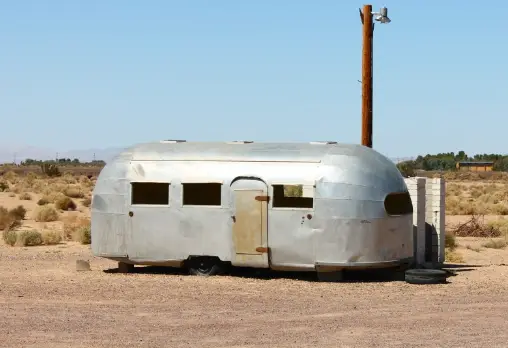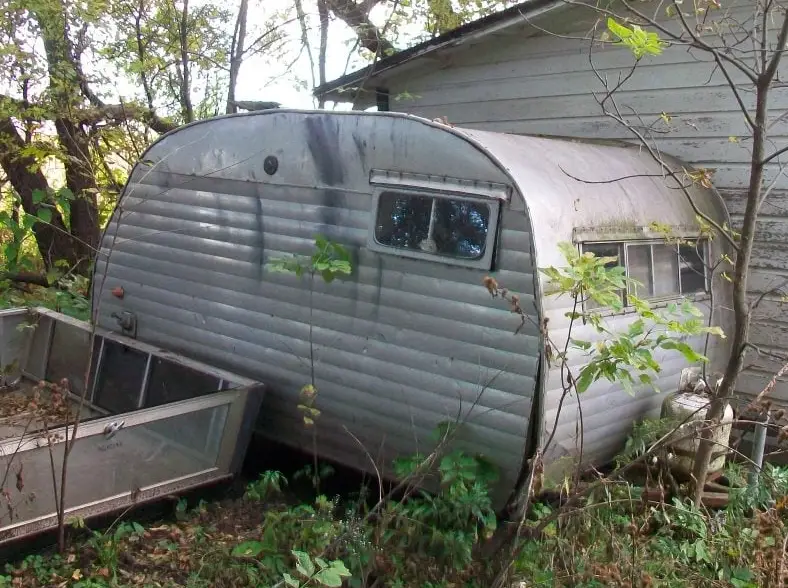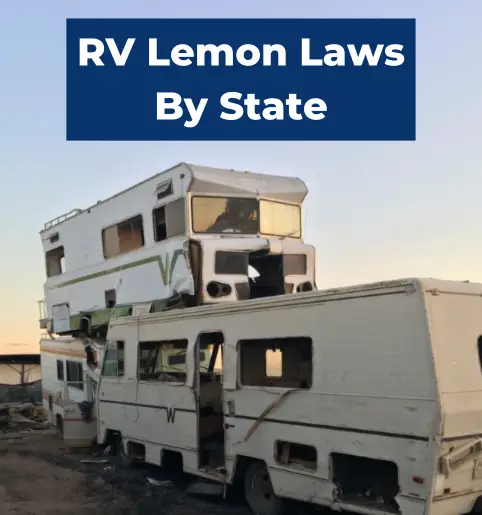RVs have become increasingly popular in recent years as families seek out alternative ways to travel. Buying a new RV should be an exciting moment in your life, but unfortunately, RVs suffer the same occasional defects as other types of manufactured vehicles. When you purchase a new RV and it just doesn’t work, you may face endless hassles and repairs that wear you down until you can’t keep fixing it. If this is the case, you may have purchased a lemon. So which states have lemon laws?
Fortunately, some states have enacted RV lemon laws to protect consumers. Lemon laws are designed to help consumers who have purchased a defective vehicle that cannot be repaired after a reasonable number of attempts. These laws provide remedies such as a refund, replacement, or cash settlement. RV Lemon laws vary by state, so it is important to know your state’s laws if you have purchased an RV that has turned out to be a problem.
We’ll go over RV lemon laws by state in this guide, along with additional info you’ll need if you are the unlucky owner of a “lemon” RV.
What is a Lemon Law?

A lemon law is a state or federal law that provides consumers with a remedy for purchasing a product that repeatedly fails to meet the standards of quality and performance. Specifically, a lemon law applies to products that have a substantial defect or malfunction that is not repairable after a reasonable number of attempts.
For RVs, lemon laws can vary by state and depend on the type of RV, whether it is a motorhome or non-motorized RV. Lemon laws typically cover defects in the chassis, living quarters, or other RV components that affect the vehicle’s use, value, or safety.
In addition to state lemon laws, the Magnuson-Moss Warranty Act is a federal law that provides consumers with additional protection. The act requires manufacturers to provide a written warranty for their products and outlines specific requirements for the warranty’s content and duration.
Under lemon laws, consumers have specific remedies available to them, such as a refund, replacement, or repair of the defective product. Lemon laws also often require the manufacturer to pay for the consumer’s legal fees and court costs.
To be eligible for lemon law coverage, the consumer must have purchased the RV for personal use and have made a reasonable number of failed attempts to repair the defect. The number of failed attempts can vary by state, but it is typically three to four attempts.
It is important to note that lemon laws only apply to defects that arise during the warranty period. If the defect arises after the warranty period has expired, the consumer may not be eligible for lemon law coverage.
Do Lemon Laws Apply to RVs?

RVs, like any other vehicle, can experience defects that can affect their value, safety, and use. Fortunately, some states have enacted lemon laws that protect consumers who purchase defective vehicles, including RVs.
When is Your RV Considered a Lemon?
The criteria for an RV to be considered a lemon vary by state, but generally, an RV is considered a lemon if it meets the following conditions:
- The RV has a substantial defect that affects its use, value, or safety.
- The defect occurs within a certain period after the purchase, usually within the first year or the first 12,000 miles.
- The manufacturer or authorized repair facility has made a reasonable number of attempts to repair the defect, but the problem persists.
It’s important to note that the definition of a “reasonable number of attempts” also varies by state, but typically, it means that the RV has undergone three or four failed attempts to repair the same issue.
In addition, some states have different lemon law coverage for motorized and non-motorized RVs. For example, only seven states include motorized RVs in full in their lemon laws, while 19 include only the chassis portion (i.e., not the living quarters or “RV stuff”). The remaining 25 states (including DC) don’t include motorized RVs at all.
For towable RVs, lemon laws also vary by state. Some states include them in their lemon laws, while others don’t. It’s crucial to check the specific lemon law coverage for your state and your RV type before making a purchase.
If your RV doesn’t qualify for a claim under the Lemon Law in your state, you may still be able to pursue compensation through the Magnuson-Moss Warranty Act. This federal law requires manufacturers to provide a written warranty for their products and outlines the remedies available to consumers if the product fails to meet the warranty’s terms.
In summary, RV lemon laws vary by state and depend on several factors, including the type of RV, the defect, and the number of failed repair attempts. It’s essential to research your state’s lemon law coverage and understand your warranty and repair options before making an RV purchase.
What States Have RV Lemon Laws?
RVs are a popular way to travel and explore the country, but sometimes, even the best-made RVs can have defects that affect their quality and performance. Lemon laws are state laws that provide a remedy for purchasers of cars and other consumer goods, including RVs, in order to compensate for products that repeatedly fail to meet standards of quality and performance.
RV Lemon Laws by State
Not all states have RV lemon laws, but many do. The following is a list of states that have RV lemon laws:
| State | RV Lemon Law Coverage |
| Alabama | Yes – Requires 3-4 unsuccessful repair attempts within the warranty period. |
| Alaska | Yes – Requires 3-4 unsuccessful repair attempts and a certain number of days out of service. |
| Arizona | Yes – Requires 3-4 unsuccessful repair attempts, a certain number of days out of service, and must be under a certain weight. |
| Arkansas | Yes – Applies to the chassis only |
| California | Yes – Requires 3-4 unsuccessful repair attempts, a certain number of days out of service, and must be under a certain weight. |
| Colorado | Yes – Requires 3-4 unsuccessful repair attempts within the warranty period. |
| Connecticut | Yes – Requires 3-4 unsuccessful repair attempts within the warranty period. |
| Delaware | Yes – Applies to the chassis only |
| Florida | Yes – Requires 4 unsuccessful repair attempts, has spent 60 days out of service and covers non-living areas of RV only. |
| Georgia | Yes – Applies to the chassis only |
| Hawaii | Yes – Applies to the chassis only |
| Idaho | Yes – Applies to the chassis only |
| Illinois | Yes – Requires 3-4 unsuccessful repair attempts and a certain number of days out of service. |
| Indiana | Yes – Requires 3-4 unsuccessful repair attempts within the warranty period. |
| Iowa | Yes – Requires 3-4 unsuccessful repair attempts within the warranty period. |
| Kansas | Yes – Applies to the chassis only |
| Kentucky | Yes – Requires 3-4 unsuccessful repair attempts within the warranty period. |
| Louisiana | Yes – Applies to the chassis only |
| Maine | Yes – Requires 3-4 unsuccessful repair attempts and a certain number of days out of service. |
| Maryland | Yes – Requires 3-4 unsuccessful repair attempts within the warranty period. |
| Massachusetts | Yes – Require 3-4 unsuccessful repair attempts within the warranty period. |
| Michigan | Yes – Require 3-4 unsuccessful repair attempts within the warranty period. |
| Minnesota | Yes – Applies to the chassis only (No certain number of days out of service). |
| Mississippi | Yes – Applies to the chassis only |
| Missouri | Yes – Requires 3-4 unsuccessful repair attempts, a certain number of days out of service, and must be under a certain weight. |
| Montana | Yes – Requires 3-4 unsuccessful repair attempts and a certain number of days out of service. |
| Nebraska | Yes – Requires 3-4 unsuccessful repair attempts and a certain number of days out of service. |
| Nevada | Yes – Requires 3-4 unsuccessful repair attempts within the warranty period. |
| New Hampshire | Yes – Requires 3-4 unsuccessful repair attempts, a certain number of days out of service, and must be under a certain weight. |
| New Jersey | Yes – Requires 3-4 unsuccessful repair attempts and a certain number of days out of service. |
| New Mexico | Yes – Requires 3-4 unsuccessful repair attempts, a certain number of days out of service, and must be under a certain weight. |
| New York | Yes – Requires 3-4 unsuccessful repair attempts and a certain number of days out of service. |
| North Carolina | Yes – Requires 3-4 unsuccessful repair attempts, a certain number of days out of service, and must be under a certain weight. |
| North Dakota | Yes – Requires 3-4 unsuccessful repair attempts within the warranty period. |
| Ohio | Yes – Requires 3-4 unsuccessful repair attempts, a certain number of days out of service plus may cause serious bodily harm. (Except facilities used for eating and sleeping). |
| Oklahoma | Yes – Requires 3-4 unsuccessful repair attempts, a certain number of days out of service, and must be under a certain weight. |
| Oregon | Yes – Requires 3-4 unsuccessful repair attempts within the warranty period. |
| Pennsylvania | Yes – Requires 3-4 unsuccessful repair attempts within the warranty period. |
| Rhode Island | Yes – Requires 3-4 unsuccessful repair attempts within the warranty period. |
| South Carolina | Yes – Requires 3-4 unsuccessful repair attempts and a certain number of days out of service. |
| South Dakota | Yes – Requires 3-4 unsuccessful repair attempts within the warranty period. |
| Tennessee | Yes – Requires 3-4 unsuccessful repair attempts within the warranty period. |
| Texas | Yes – Requires 3-4 unsuccessful repair attempts within the warranty period |
| Utah | Yes – Applies to the chassis only |
| Vermont | Yes – Applies to the chassis only |
| Virginia | Yes – Applies to the chassis only |
| Washington | Yes – Applies to the chassis only |
| West Virginia | Yes – Applies to the chassis only |
| Wisconsin | Yes – Requires 3-4 unsuccessful repair attempts, a certain number of days out of service, and must be under a certain weight. |
| Wyoming | Yes – Requires 3-4 unsuccessful repair attempts, a certain number of days out of service, and must be under a certain weight. |
It is important to note that RV lemon laws vary by state, and the criteria for enforcement can also vary. In general, to be covered by a lemon law, the problem must be a substantial defect that is covered by the manufacturer’s warranty and that substantially impairs the use, value, or safety of the RV. The problem must also persist after a reasonable number of attempts to repair it.
If you have purchased an RV that is a lemon, you may be entitled to compensation under your state’s lemon law or the Magnuson-Moss Warranty Act, a federal lemon law that applies to all consumer products. It is important to contact a qualified attorney who can help you understand your rights and options and guide you through the process of seeking compensation from the manufacturer.

